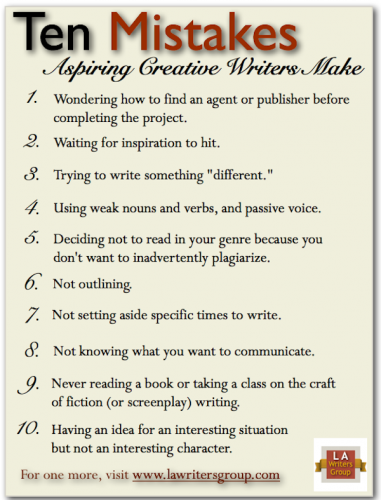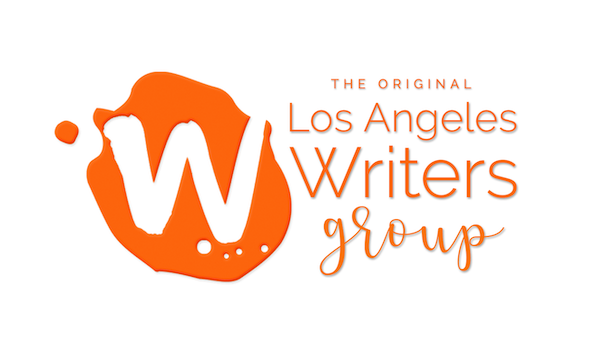After ten years of running LA Writers Group and working with writers in both workshops and one-on-one coaching, I’ve noticed patterns that hold many writers back from reaching their goals. Here are ten common mistakes I’ve seen aspiring creative writers make:
1. Wondering how to find an agent or publisher before completing the project.
Yes, it’s exciting to think about publishers and agents, but right now your job is to write your creative project. Redirect your focus from the dream of being a writer to sitting down and writing. Finishing your project should be the only thing you focus on right now, not finding agents / publishers. That comes much later. The exception here is if you are writing a nonfiction book proposal.
2. Waiting for inspiration to hit.
Professional writers generate inspiration. They take an active role. They don’t wait for inspiration to hit them (although it’s nice when it happens). This is one of the things we do in our workshops, we show writers how to manufacture inspiration. Inspiration does not have to be random. You can create it!
3. Trying to write something “different.”
Everyone wants to write the one unique project that everyone notices and if that is your goal then certainly you should aspire to it. For new creative writers, this tends to manifest as way of inadvertently avoiding proper structure or character development. All this does is communicate you don’t know what you are doing. Follow the rules first. Show people you know what you’re doing. Then after you’ve established yourself, you can break all the rules you want. Don’t break the rules to break in.
4. Using weak nouns and verbs, and passive voice.
Many newer writers use weak nouns and verbs / passive voice. This can undermine an otherwise compelling sentence. Grammar Girl offer a great example of this:
“In passive voice, the target of the action gets promoted to the subject position. Instead of saying, “Steve loves Amy,” I would say, “Amy is loved by Steve.” The subject of the sentence becomes Amy, but she isn’t doing anything. Rather, she is just the recipient of Steve’s love. The focus of the sentence has changed from Steve to Amy.”
5. Deciding not to read in your genre because you don’t want to inadvertently plagiarize.
I hear this a lot. New writers are terrified of ‘inadvertently plagiarizing’ if they read other writers in their genre. You must read in your genre to understand the specific structure of that genre and why successful work is successful. If you are writing a memoir and have never read a single memoir, how do you know how to write one? Don’t worry, your own unique expression will be your own.
6. Not outlining.
I’m sure it’s true that many established writers do not outline, but an aspiring writer is not yet established. You need to know your story’s beginning, middle, and end before you can construct a scenes that move the story forward. The outline doesn’t have to be perfect. You can add to it and morph it as you go along (what I call a “living outline,” but know where your character/story is headed and why. As a new writer, this will help focus you.
7. Not setting aside specific times to write.
If you want to be a published author you must treat your goal like a job. Set a schedule. Stick to it. If you like to write in the mornings then set aside specific times to write and then actually sit your butt down and start typing. You have to write if you want to be a writer.
8. Not knowing what you want to communicate.
In every story, the main character changes in some way. Stories have a message / journey / theme that communicates something to the reader. Maybe that is ‘this is how these people handled the issue of abortion,’ or maybe it’s more like Lajos Egri would suggest such as ‘injustice leads to war,’ or it could be moral in nature such as ‘stealing is a gateway drug.’ The bottom line is you need to know what you want to say, what you want the reader to take away or ponder.
9. Never reading a book or taking a class on the craft of fiction (or screenplay) writing.
You need to know how to write a scene instead of ‘tell’ what is happening. You need to understand scene structure, how to write good dialogue, how to use subtext, what purpose exposition serves, and a myriad of other aspects of the craft. If you’ve never learned how to write fiction, then you are spinning your wheels.
10. Having an idea for an interesting situation but not an interesting character.
A situation can be interesting but only in the context of a character’s journey. If you are not inserting a person into that situation to see how they react, then you do not have a story. I have many people come to me with ideas like, “Wouldn’t this make a great story? ‘California’s water supply gets turned off!'” Nope, not interesting. The situation is only interesting in the context of the someone experiencing it, or causing it, or trying to repair it, or escape it, etc. Readers relate to characters in situations, not simply situations.
Bonus Add-On:
11. Self-publishing your first draft.
This one breaks my heart. It doesn’t matter how many times you’ve rewritten individual chapters, if you haven’t done several rewrite passes on your manuscript and sought the help of a professional fiction editor, do not self-publish your novel. Especially don’t do this if this is your first novel and you feel absolutely confident that your novel is ready to publish and/or you have not sought the help of a professional fiction editor and a professional proofreader. These are sure signs your novel is not ready for self-publishing. Yes, editors are expensive, but they are worth it. Consider the long-term opportunity lost of publishing a novel that is not ready for publication.
Can you think of other mistakes aspiring writers make, or perhaps one you’ve made that you can share with us? Leave a comment here.

2 Responses to "Ten mistakes aspiring creative writers make"
You must be logged in to post a comment Login